
|
|
Issue Number 14 • Tuesday, April 4, 2023 |
Campus ChampionAfter 28 years as head coach of the men’s basketball program, Tom Spanbauer ’83, M ’86 announced his retirement. He’s stepping back from basketball, but SUNY Cortland is fortunate that he’ll continue as a lecturer and head women’s tennis coach. This Campus Champion’s love for SUNY Cortland runs deep and this longtime volunteer will continue to give back. Find him at Commencement, where he’s been a marshal as long as he can remember — “It’s the happiest event on campus,” he says. Also, he’ll be volunteering at student conduct hearings, Midnight Breakfasts and as a member of the Campus Safety Committee. Tuesday, April 4Charles N. Poskanzer Lecture: “The Hitchhiker’s Guide to Tobacco Product Regulation: Promise and Peril in an Increasingly Complex Landscape,” presented by Brian King from the Food and Drug Administration, Old Main Brown Auditorium, 5 p.m. Also available on Webex. Dowd Gallery Documentary Screening: Why Art Education Matters Part 1, Compilation of Shorts and Talks, Dowd Gallery, Room 106, 5 to 6 p.m. As part of the Imagination Celebration, exhibition of art by K-12 Students and Teachers Alumni Speaker Series: Careers in Human Services, presented by the Alumni Association and Career Services, online via Zoom, 6:30 to 8 p.m. Y2Karaoke: Corey Union first floor lounge, 7 to 9 p.m. Wednesday, April 5Sandwich Seminar: The Benefits of Prioritizing Physical Activity for Children, presented by Physical Education major Joseph Iadevaio, Old Main Colloquium, 12:30 to 1:30 p.m. Exploring Entrepreneurship: One Alum’s Journey with Merchon Brower Hargrave ’09 online via Webex, 4 p.m. Workshop: Behind the Post, explore the differences between healthy and unhealthy relationships, and the role social media can play, Corey Union Exhibition Lounge, 5 to 6 p.m. Thursday, April 6Sandwich Seminar: "Description, Source and Significance of Building Stones Used at SUNY Cortland’s Camp Huntington, Raquette Lake, NY, 1877 – 1900,” presented by Robert Darling, Distinguished Teaching Professor Geology, Old Main Colloquium, noon to 1 p.m. Lecture: Africa’s Relations with Central and Eastern Europe in a Changing Global Order, presented by Stefan Cibian, director, Făgăraș Research Institute and associate fellow, Chatham House - The Royal Institute of International Affairs, Sperry Center, Room 104, 4:30 p.m. Dowd Gallery Documentary Screening: Why Art Education Matters Part 2, Compilation of Shorts and Talks, Dowd Gallery, Room 106, 5 to 6 p.m. As part of the Imagination Celebration, exhibition of art by K-12 Students and Teachers Friday, April 7SAFER Volleyball Tournament: Park Center gymnasium, 4 to 7:30 p.m. Dowd Gallery First Friday: Organized by the Cortland Arts Connect, 5:30 to 8 p.m., virtual and in-person, Dowd Gallery, Room 106 and online via Facebook, Instagram and the Dowd Gallery website. Monday, April 10Re-Thinking Abilities Workshop: Register for Re-Thinking Abilities Workshop #2, 4 to 6 p.m. Tuesday, April 11Panel Presentation: International opportunities for Cortland faculty, Corey Union Fireplace Lounge, 4 to 5:30 p.m. Interview Essentials: Presented by Nan Pasquarello, director of career services, online via Webex, 4 to 5 p.m. Dowd Gallery Talk: Thomas Albrecht, professor, department chair and associate dean, School of Fine Arts, SUNY New Paltz, online via Webex, 5 p.m. Wednesday April 12Sandwich Seminar: “I Learned by Doing,” presentations from four Institute for Civic Engagement Action Team interns, Old Main Colloquium, 12:30 to 1:30 p.m. Brooks Museum Lecture Series: “‘Evolution and All That’: Why Americans Can’t Stop Fighting about Creationism," presented by Adam Laats, an assistant professor in Binghamton University’s Department of Teaching, Learning and Educational Leadership, Moffett Center, Room 115, 4:30 p.m. A reception to welcome Adam Laats precedes the talk at 4 p.m. in the adjacent Brooks Museum. Distinguished Voices in Literature: Barrett Bowlin, author of the short story collection Ghosts Caught on Film, Dowd Gallery, Room 106, 5 p.m. Recreational Sports Powerlifting Meet: Student Life Center, 6 p.m. Brendan Gay’s Comedy Show: Corey Union Function Room, 7 p.m. Thursday, April 13Book Authors Event: Recognizing campus book authors from 2020 to 2022 at an annual event, Memorial Library, 3 to 4 p.m. Teacher Certification Requirements Overview: Online via Webex, 6 to 7 p.m. Friday, April 14Cortland Nites: Roller Skating, Corey Union Function Room, skates provided, 8 p.m. Monday, April 17Michael Misko's Magic Show: Corey Union Function Room, 8 to 9 p.m. Wednesday, April 19Presentation: Marty Essen's "Around the World in 90 Minutes," an Earth Week 2023 event sponsored by the Campus and Artist Lecture Series, Old Main Brown Auditorium, 6:30 p.m. |
Greg Sankey ’87 leads SEC, lends motivation for students03/29/2023As the second half of SUNY Cortland’s spring semester picked up its pace, one of the most influential voices in college athletics offered a two-day masterclass on leadership and career advice for students with sport-related interests. The teacher was Greg Sankey ’87, the highly respected commissioner of the NCAA’s Southeastern Conference (SEC). Sankey, a native of Auburn, New York, and former Cortland physical education major, returned to campus March 28 and 29 for an executive-in-residence program that included visits to five sport management classes and meetings with faculty, staff and Red Dragon student-athletes. Topics spanned everything from job search tips to crisis communications to governance in college sports. “I can recall, when I was a student, there were these moments where people would come in to visit and those were learning experiences outside of the traditional classroom,” said Sankey, 58, who now resides in Birmingham, Alabama. “From that personal experience, there’s a responsibility to try and provide those opportunities for young people during their college years.” A lot has happened in Sankey’s career since his last in-person visit to campus in October 2014, most notably an ascent to leading the NCAA’s most visible and successful conference. His tenure as SEC commissioner since 2015 has involved adding member institutions, working to expand the College Football Playoff and navigating the challenges of the COVID-19 pandemic. The spotlight brought more success, as suggested by a 2022 Sports Illustrated profile that confirmed “(Sankey’s) admiration is echoed throughout the league, from athletes to coaches to administrators.” His recent SUNY Cortland visit, however, was low-profile and, in some ways, a chance for Sankey to return to his roots in education. It was a brief pit stop in upstate New York before he heads to the women’s basketball Final Four in Dallas, where SEC squads make up half of the remaining field. Sankey shined as a storyteller in classrooms — tracing his own career arc to offer big-picture lessons, using a unique sense of humor and impeccable memory to connect with students and making several book recommendations in the process. “The phrase that stuck with me in my prep notes is that you’re six weeks away from graduation,” said Sankey, speaking to a room of roughly 50 sport management majors enrolled in a senior capstone course. “All of this will be on the test.” The test was a metaphor that Sankey referenced frequently. He answered questions directly from students and shared many personal stories, including several from his time at Cortland, that doubled as life lessons. Among the highlights of his advice and anecdotes: Figure out a frameworkBack in the spring of 1987, Sankey was nearing his graduation from Cortland and enjoying a field experience at the W.H. Parks Family Center for Environmental and Outdoor Education at Raquette Lake, the university’s outdoor campus in the Adirondacks. “I figured I was going to be teaching at the elementary or junior high school level and probably coaching,” he said. “I thought maybe I could coach Division III basketball at some point.” 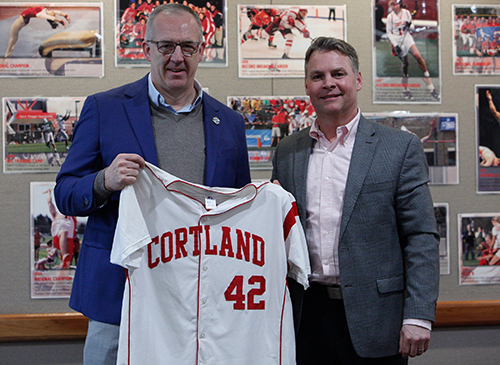 He had two job prospects that following summer: coaching low-level college basketball or becoming the director of intramural sports at Utica College. The latter offered the opportunity to earn a graduate degree for free. “I framed up my thinking,” said Sankey, who worked two years at Utica while earning a master’s in education from Syracuse University. “If somebody was going to pay for grad school and I could get a little bit of experience, I was going to take that job.” He discussed the value of an advanced degree. In 1987, Sankey considered pausing his graduate studies for a year before Utica’s athletic director at the time, Jim Spartano, provided pivotal career advice. “I had just spent five years reading books and research that everyone else wanted me to read,” said Sankey, a voracious reader. “I wanted to take a year to read what I wanted to read. (Spartano) gave me the best piece of advice anyone has ever given me in my career. He said, ‘If you don’t start now, you never will. It’ll just become more difficult.’” Pointing to the SEC logo on his sweater, Sankey told Cortland seniors that his career path could have been drastically different if he delayed his education. “Opportunities that were presented to me, in part, were all about timing,” he said. “It’s actually not about who you know. It’s about what you know, the job you do and the opportunities you decide to take.” Money follows, it doesn’t leadWith a master’s degree in hand, Sankey’s new guiding framework became the challenge of working in Division I athletics. But the paycheck didn’t initially match the jump in divisions. In 1989, he gave up a comfortable salary at Utica for work in compliance and academic services at Northwestern State University in Natchitoches, Louisiana. The new job initially paid $500 per month without benefits. He had been married to his wife, Cathy, for less than a year at the time and estimated they had saved enough money to keep them afloat from July to December. He remembers an honest conversation that they shared. “I told her I wanted to work in Division I college sports and see how far it might go,” said Sankey, who will celebrate 35 years of marriage in November. “If we couldn’t afford our existence, I figured we’d pack up our 1987 Dodge Shadow, I’d substitute teach and maybe we’d have to live with our parents for a little while to get back on the right track.” Instead, they lived through Louisiana summers without air conditioning to cut costs and Sankey took on added duties as head golf coach at Northwestern State. He told Cortland students to budget responsibly, never to pay for a $3 latte on a credit card and let their work ethic lead them. “I would submit to you that when you get that first job — as long as it’s not illegal, unethical, morally improper — then you should say yes to every opportunity,” Sankey said. “I’m not good at golf, but I won an award for coaching a college golf team at the Division I level in my second year. “If you’re going to do it, do it really well. Throw yourself at it.” Don’t be limited by geographySeveral times during his conversation with graduating seniors, Sankey recalled a limited worldview that he carried into his early 20s. He grew up in a hard-working, blue-collar family in nearby Auburn, New York, with a father who was a welder and a mother who believed strongly in education. After briefly studying engineering at a small college in Texas, he reset at Cayuga Community College and eventually transferred to Cortland. Sankey commuted to campus and focused on local sports endeavors during his college days, running a recreation program in the Town of Cayuga while assisting high school basketball and baseball teams. “My horizon to the east was Albany, my horizon to the west was Buffalo, I really wasn’t thrilled about moving north — I had an uncle who taught in Phoenix, N.Y. — and down to Pennsylvania,” he said. “A two- to three-hour drive is what I could see at that point in life.” His leap of faith from upstate New York to Louisiana was followed by a move to Texas in 1992 and a 10-year stint in progressive leadership roles with Division I’s Southland Conference. In 1996, he was named commissioner at just 31 years old. He spent six years during his mid- to late-30s in that role — one of just 32 such jobs at the Division I level — but sought a change in 2002. He sensed a feeling that he likened to teacher burnout, a topic that he learned about in the university’s Park Center. “I learned in this building what teacher burnout is and what causes it,” he told students in Park Center’s C-Club Hall of Fame Room. “…It’s no way to live. I wasn’t going to do it as a teacher and I wasn’t going to do it as a conference commissioner.” Sankey explained that a move to be associate commissioner in the higher-profile SEC actually came with an initial decrease in pay, but that new challenges and growth opportunities made the change worth it. He told students: “I challenge you as you think through the next six weeks: what’s the ‘why’ of the job you take?” Things aren’t always neat and cleanThe SEC’s prominence and that of its commissioner is well-documented. The conference has earned 42 national championships during Sankey’s leadership tenure, including six of the past eight in football. Among his many accomplishments, Sankey has overseen a milestone broadcast agreement, led several initiatives focused on student-athlete well-being and co-chaired the Division I Transformation Committee, a group of college sports leaders tasked with addressing the most significant challenges in college athletics. “With what I do, the highs are really high, like 65-7 in the national championship game,” said Sankey, referring to the University of Georgia’s dominating win in the most recent College Football Playoff title game. “But that’s Monday night. If something happens on Tuesday, then Monday doesn’t matter.” Students asked about the biggest challenges in the commissioner’s role and he explained that they vary day to day and that they’ve evolved over time. He discussed an example from 2015, following a white supremacist’s mass shooting in Charleston, South Carolina. The SEC was asked for its position on state-sanctioned displays of Confederate battle flags in places such as South Carolina and Mississippi. “I had been commissioner for two weeks, but we made a very clear statement about the need for change around the Confederate battle flag display,” Sankey said. 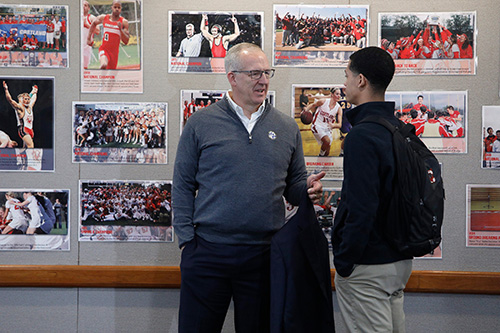 As the longest-tenured commissioner of conferences that many refer to the “Power Five,” a term that Sankey said he prefers not to use, he is considered a natural leader. Many people looked to him for guidance during the COVID-19 pandemic. “I remember sitting there on my front porch thinking that I went to Cortland to teach physical education and now people wanted to know if we’re going to have a college football season,” he said. He referenced two quotes on display in his office. “Champions do extra,” reads one attributed to the All Blacks national rugby team of New Zealand. Another that he wrote down during a speech by former President Bill Clinton says simply, “Problems yield to effort.” Sankey described the effort and challenges that can come with planning six consecutive weeks of conference championships across six sports during the winter and early spring. “Do you know which one of them we get to do halfway?” he asked students. “Absolutely none of them.” Never stop learningLifelong learning has been the consistent theme of Sankey’s career trajectory. He recalled a lesson that he learned as a physical education major in a sport history class taught by Dr. Norma Carr. “She asked us one day, ‘What does going to college do for you?’” Sankey told current students. “Her philosophy was that it makes you smarter faster.” Sankey implored the room full of senior sport management majors to continue learning and improving even after their Cortland graduations, whether that involves refining their cover letters and resumes, reading new books or taking on new challenges. “If you think you’re done learning, then you are actually done,” Sankey said. “You’re not going to advance. Part of my drive is, ‘How do I continue to learn?’” The question seems strange coming from the person who many consider to be one of the sharpest minds in college athletics. But Sankey said he still takes time every June to consider if he’s learning and being challenged. He encouraged Cortland students to do the same. “When you’re 58 like I am and you look back when you were 22, you realize life comes at you fast,” he said. “But you’ve got some time to get it right. “Use the time early to make the adjustments so that you can take some of those leaps of faith.” Winging it: peregrine falcons take flight at SUNY Cortland04/05/2023SUNY Cortland’s campus has long attracted some of the nation’s best students, faculty and staff. As of late, it’s drawn in a new group known for being very selective: peregrine falcons. Peregrines are the fastest birds in the world, reaching speeds of more than 200 miles per hour as they drop from the sky like cruise missiles to snatch their favorite prey – other birds – out of the sky. The crow-sized predators are an endangered species in New York, where widespread use of the pesticide DDT wiped out the Empire State’s population by 1965. Since they were reintroduced in mid-1970s, the birds have slowly made a comeback. Most of them have established themselves among the peaks of the Adirondack Mountains, in the cliffs and bridges along the Hudson River, and on the ledges of skyscrapers in New York City, according to the New York State Department of Environmental Conservation. And, for the last several years, at SUNY Cortland. It’s not that surprising that the peregrines like SUNY Cortland, according to Steven Broyles, a SUNY Distinguished Teaching Professor in the Biological Sciences Department. 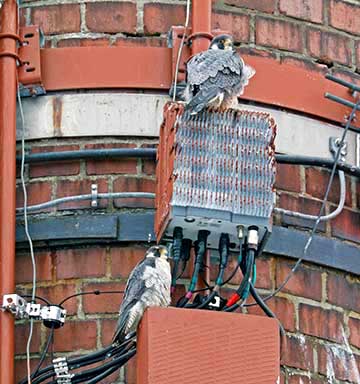
“We have had the birds overwinter here in Cortland,” he said of the falcons, which typically fly south as temperatures drop in the fall. “I am guessing that the abundance of pigeons, mourning doves, American crows, and maybe ducks at the Waterworks keep the birds well fed during the winter.” In 2015, one of the students in Broyles’ Ornithology class first notified him of a peregrine falcon appearance at Casey Tower residence hall. Affectionately named “Casey,” the bird has roosted on the Casey and Smith Towers every winter since then. Recently, two more of the birds — possibly a mating pair — were found. Students Emily Faulk and Kaleb Frierson, who are taking Broyles’ Ornithology class, discovered them at the former steam plant smokestack near Bowers Hall and Old Main. While it’s said that birds of a feather flock together, that’s not so common for peregrine falcons. They mate for life but are otherwise solitary hunters. That’s strong evidence that points to the two falcons being a mating pair. “One bird was about one-third bigger than the other. Female peregrines are generally one third bigger than males. Peregrines are also territorial and having two birds tolerate one another like this is suggestive of a mating pair. A mating pair in Cortland is very cool.” Broyles said the number of falcons throughout North America likely dipped to fewer than 700 birds in the 1960s but has now reached between 6,000 to 10,000. New York still hasn’t recovered to its previous levels of peregrine population, making every breeding pair important. If SUNY Cortland’s two smokestack birds are mating, finding their nesting site may not be easy. Peregrine falcons are known to nest on cliffs, window ledges, rooftops or bridges. But that doesn’t mean they’re not particular. "My understanding is that they prefer ledges with a little bit of overhead covering,” Broyles said. “The smokestack does not provide that kind of location. ... I have seen a peregrine fly in the downtown area several times. We really need more eyes in the community to report good observations.” SUNY Cortland’s unused smokestack acts as a high watchtower for the birds during the daytime. Broyles suspects they use it to launch foraging flights. He recalls a walk several years ago in early spring when a loud sound drew his attention to a cloud of feathers in the air. Following the bird to the Towers, he found a peregrine falcon with its prey. It had struck a mourning dove out of the air, killing it for food. Whether or not falcon young (or Eyas) are on the way, anyone lucky enough to spot them is in for a treat. It’s a familiar excitement, Broyles says, for students in Ornithology. “Most field classes are eye-opening to students,” he said. “After ornithology, they hear more and see more movement in nature. Nearly all the 80 to 100 species that they see will be something new and different.” Capture the MomentAdmissions tour guide Ramona Lewis, wearing a red jacket to the right, directs students and their families during SUNY Cortland’s Accepted Student Open House on Saturday, April 1. With temperatures approaching 70 degrees by early afternoon, the senior psychology major and Cortland’s other guides had a busy day. One of the highlights was the ice cream social in the Student Life Center, where more than 800 people were treated to Cortland’s Red Dragon Delight ice cream. In Other NewsSUNY Cortland dining increases food recyclingTo some people, food that goes uneaten is trash. To Nichole Edwards, the meal leftovers offer a teachable moment, a challenge and an opportunity to help address hunger in the community. “It sounds a little silly to be proud of your waste, but I’m very proud when I look at all that doesn’t go in the trash and the effort that our staff puts into getting things ready for compost,” said Edwards, the associate executive director of SUNY Cortland Auxiliary Services (CAS), which operates the university’s dining services. Last year, Cortland Auxiliary took action that kept nearly 63,800 pounds of uneaten food out of Cortland County’s landfill. That’s nearly 29 tons, or roughly equivalent to a stack of New York style pizzas half a mile tall. It did that by increasing the amount of scrap food waste it composted by a third, from 46,200 to 61,498 pounds. In addition, it more than tripled its donations of unused food to local pantries by about one-third, from approximately 600 to 2,300 pounds, sending both fresh and nonperishable foodstuffs to local food pantries, including Loaves and Fishes, Cortland YMCA, Cortland YWCA, Seven Valley Food Coalition and the university’s own SUNY Cortland Cupboard for students. “What goes where depends on who’s going to be able to make the best use of it,” said Edwards, who joined the Cortland Auxiliary Services more than 12 years ago and was appointed to her current role more than two years ago. “Health code wise, we can donate it as long as it hasn’t been touched by a customer, so as long as it wasn’t actually on the serving line where the customer could have used the tong, because you can’t control cross-contamination at that point,” she said. “We can put it into a meal to-go container for the SUNY Cortland Cupboard, for a student to take home with reheat instructions.” In January, CAS for a second year revealed the amount of generated waste it handles when turning in required annual reporting for businesses and institutions. The New York State Department of Environmental Conservation (DEC) asked CAS to provide data on how much excess food the campus both composts and donates. 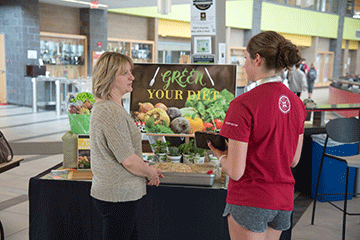 The report gives the campus the means to benchmark its food service sustainability progress. Cortland Auxiliary is required to donate wholesome excess food to help address hunger regulated under the New York State Food Donation and Food Scraps Recycling Law. The CAS is exempt from composting unusable food waste, due to the campus being too far away — more than 25 miles — from a state-certified composting company. Yet CAS composts waste food anyway, sending most scraps away with Natural Upcycling and its fryer oil for repurposing with Restaurant Technologies (RTI). “We continue to review data to minimize any over-production, so the increase reflects that we are capturing more of the foods that would have gone in the landfill rather than showing an increased quantity of total food produced that then was wasted,” Edwards said. “As much as the number went up this year, our per meal food waste is down most of the time,” Edwards said. “So that tells me we are doing the right things in the individual moment, in terms of just-in-time cooking, not overproducing, reading into what the students are actually asking for as far as food, and producing food that’s going to get eaten rather than just thrown out.” Years ago, Auxiliary Services had implemented many programs and initiatives that now enable the company to quickly adapt to the relatively recent New York State Department of Environmental Conservation recycling and donation requirement. Now, Edwards and the dining operation staff use these waste tracking metrics to tailor their food offerings and menus by garnering customer feedback, as well as in staff development. “‘Lean Path’ has been with us for about 10 years,” she said. “That’s a program we use in residential dining where we can actually weigh the food coming off the line, and the food coming back from students’ plates.” The metrics also serve as an educational tool. “We’ll be doing “Weigh the Waste” again for Earth Day,” Edwards said. “We’ll bring our scale out front so students can actually see the volume of the food that they as a customer put back in the system; they can see what it looks like by the hour and how much that looks like in a given day.” 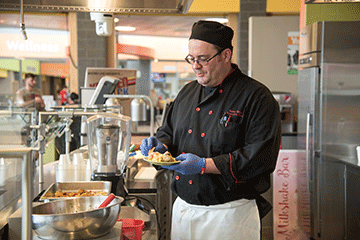 Trays that can be overloaded with food are long gone and plates have shrunk, inspired about a decade ago by the national Partnership for a Healthier America, which recognized SUNY Cortland as one of the healthiest campuses in the United States. “Not getting your meal all at once gives you that mental time to read your body’s signal as far as whether or not you’re satiated,” she said. Edwards takes part in meetings of the university’s Sustainability Coalition. She works closely with Auxiliary Services employees including a senior dining manager involved with the SUNY Cortland Cupboard’s Fill the Fridge Fridays program. “It’s a team effort, I just bring all the pieces together,” she said. Some of the best ideas were suggested by staff and student workers, for example, biodegradable straws that won’t clog the stomachs of marine animals. “It’s staff who came to us and said, ‘Hey, can’t we do something better?’ That makes me happy, because if we’re all aware and we’re all looking at it, somebody’s going to come up with a better way to do something.” Edwards arrived at Cortland with dual bachelor’s degrees, a B.A. in theatre and a B.A. in history with teaching certificate from Otterbein University in Westerville, Ohio, plus middle school teaching experience. Two years ago, she earned a master’s degree in human resources management from Southern New Hampshire University. “Theatre people are good at being creative and finding solutions to things,” Edwards said. “You’ve just got to make it all fit and make it work because ‘no’ is not an option.” Her education background is helpful, too. “They are coming to college and there are greater and different experiences than back home,” she said. “They are just so wonderful when we can work on things that really matter.” Yung Gravy will headline Spring FlingPlatinum-certified rapper Yung Gravy will headline SUNY Cortland’s Spring Fling concert on Saturday, April 29 in the Park Center Alumni Arena. Also performing will be D.J. Lady Verse and country singer Kristen Merlin. Doors open at 6 p.m. for the 7 to 11 p.m. show. Tickets remain on sale in person on select dates. Follow the SUNY Cortland Student Activities Board on Instagram for full details. Payment is cash only — $20 for Cortland students, $30 general admission and $50 at the door. The concert caps a week of Spring Fling activities organized by the Student Activities Board, including the annual Spring Fling Carnival, which will be held on the lawn of Moffett Center from 11 a.m. to 3 p.m. on the day of the concert. The carnival also marks the final opportunity to purchase tickets at the Cortland student price. A full list of events is included below. Yung Gravy blends modern rap with vintage themes from music of the 1950s through the 1980s to create energetic and amusing songs. He first gained recognition in 2016 with “Mr. Clean,” which went platinum. In 2022, he released his first Billboard Hot 100-charting hit, “Betty (Get Money).” His song “Gravy Train” became the locker room victory anthem of the Tampa Bay Lightning as they moved toward their eventual 2022 Stanley Cup title and was inscribed inside the teams official Stanley Cup rings. Spring Fling 2023 Events ScheduleFriday, April 21 Spring Fling T-shirt Giveaway Saturday, April 22 Spring Fling Color Run Sunday, April 23 Tie-Dye Spring Fling T-shirts Monday, April 24 Spring Fling Bingo Night Tuesday, April 25 Spring Fling Comedy Night Wednesday, April 26 Spring Fling Groovy DIY Night Friday, April 28 Spring Fling Glow Foam Party Saturday, April 29 Spring Fling Carnival Spring Fling Concert: Yung Gravy The Big Event returns on April 23On Sunday, April 23, a small army of SUNY Cortland students will once again spread out into the Cortland community, cleaning, painting and otherwise sprucing up their town, as The Big Event returns after a three-year COVID-19 interruption. Planning progresses with 405 volunteers to date who registered by the March 24th deadline, said Anneka Bowler, the Student Government Association president and the catalyst for restarting the fairly new campus tradition. That will include student groups such as the athletic teams men's volleyball and women's rugby and the Greek organizations Delta Phi Epsilon, Sigma Delta Tau. And more are still asking to participate, she said. "We are feeling so optimistic about this event," Bowler said of the five hours of spirited student-led community service, which became a Cortland tradition in 2015. "To our knowledge, it will be one of the biggest events held at SUNY Cortland since 2019. The response that we have gotten from students is overwhelming, and it is really clear that SUNY Cortland is excited about giving back to the community." Organizers now are mainly focused on securing donations of rakes and other items needed for the cleanup. They are also still looking for community members and organizations that need of help getting their properties cleaned up after winter and arranging for the student volunteers to be shuttled where they are most needed, Bowler said. So far, they have more than 40 work sites mapped out. On April 23, registered volunteers should check in at 9 a.m.in the Corey Union Function Room. The event kickoff will feature remarks by SUNY Cortland President Erik J. Bitterbaum, Bowler and potentially others. The Big Event lasts until 2 p.m. 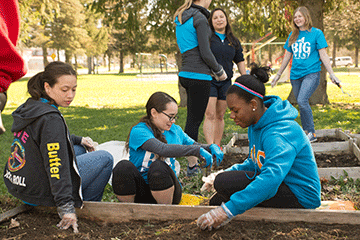 Registered participants will be contacted by email at least two weeks in advance of the event with more details. “I am very grateful that I have the opportunity to reintroduce The Big Event to you all,” said Odyssey Bassett, the coordinator of events for the Student Government Association (SGA) and an organizer of this year’s event. She is a a senior biomedical sciences major from Albany, N.Y. “In the past, SUNY Cortland held The Big Event to bring students, faculty and staff together to complete one big day of service for our neighbors in the community, and to say, ‘thank you’ to the Cortland community,” Bassett said. Bowler, a junior political science major from Pearl River, N.Y., said she wanted to bring back The Big Event this year to improve relations between the college and the community. "Students should realize that they temporarily occupy a space where some people live permanently, and giving back to the community is important in situations like this," Bowler said. "I didn't participate in the last one but I had heard about the great things that the event did for the college and community," she said. "After COVID, bringing back The Big Event seemed like a great idea. I hope that future administrations of student government continue this." Participation by members of Greek organizations, student clubs and athletic teams has fostered a strong turnout in the past. That momentum was stopped cold, however by the start of the COVID-19 pandemic. Volunteer work may include raking leaves, cleaning up trash, painting front porch steps, and any other requests SGA receives from community members. Volunteers are encouraged to bring their own equipment but the SGA will supply tools to those who don't bring them. 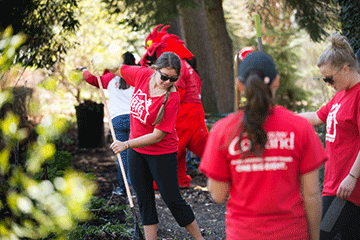 This year's The Big Event plans to follow the same general format as in the past, with a continental breakfast supported by SUNY Cortland Auxiliary Services. Volunteers receive their assignments and free T-shirts. For more information, contact Bassett. Updates will be available on the Cortland SGA Instagram page. Founded at SUNY Cortland in 2015 by Ashlee Prewitt ’14, the student club Actively Involved in the Community (AIC) was previously responsible for organizing this event each spring. More than 400 volunteers participated in the first The Big Event in Cortland. The Big Event is part of a national movement on college campuses. It originated in 1982 as a student-run service project developed by Texas A&M University. Although there is no nationally recognized organization for this specific event, colleges and universities across the U.S. have adopted similar projects on their campuses. Cortland joins nationwide effort to save local journalismSUNY Cortland is joining a nationwide network of college and university programs aiming to support local news organizations by tapping the energy and talent of students. The university is hosting the first Upstate New York faculty training session by the Center for Community News (CCN), a nonprofit that works to help create and connect student newsrooms throughout the United States. In addition to SUNY Cortland faculty, educators from nine other New York higher education institutions are expected to attend the April 14 event and then create, or strengthen, community journalism on their campuses. “So much evidence shows that a lack of local news contributes to increased polarization in society,” said CCN founder and SUNY Cortland alum Richard Watts ’85, noting the dramatic reduction of local news operations that has occurred over the last several decades. “On one hand, this is a win for students, and then on the other hand you’re providing content. That is what’s needed … I see this as part of the solution.” Part of SUNY Cortland’s contribution to the solution will be a new public affairs radio show and podcast focusing on local news beyond the confines of the campus. Caroline Kaltefleiter, a former broadcast journalist and current professor in the Communication and Media Studies Department, will host and manage a team of student reporters. The proposal earned a community news grant from CCN, and Kaltefleiter is now a CCN faculty champion. Watts, a journalism professor at the University of Vermont, created the first CCN newsroom on his campus in 2019, guiding student journalists in reporting and producing local news stories and connecting with programs at other institutions. “Similar programs exist,” he said. “But there hasn’t been any collection of them all so they could learn from each other and inspire each other.” Watts’ vision is to connect the 120 university-led student reporting programs around the nation in a way that coordinates coverage, shares best practices and supplements news content that is increasingly hard to find as news payrolls shrink and organizations combine or collapse. “The students can learn applied skills through being a reporter, where you interview people and you take complicated subjects and turn them into stories,” Watts said. “All these critical skills are going to be helpful to you, so there’s that applied or experiential learning component that is so important to young people who want to do real things.” Symposium helps DIII athletes adjust after collegeDivision III student-athletes face some difficult challenges and no easy answers. To help them, faculty and professional staff at SUNY Cortland created the Institute for DIII Athlete Wellbeing and Athletic Leadership Virtual Symposium. This year’s event took place Monday, April 3 from 10 a.m. to 3 p.m. This second annual symposium, with the theme “It is Not an End But a New Beginning: Knowledge and Tools for Healthy Transitions Within and Away from Athletics,” supported and trained athletes, coaches and administrators involved in DIII sports. It aims to start a national conversation about the unique problems they face. Bonni C. Hodges, a professor of health and SUNY Distinguished Service Professor, believes this series of symposiums may be the first of its kind to focus on DIII athletics. 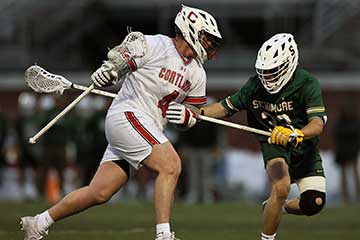
“It is not so much that DIII athletes have unique wellbeing challenges but rather fewer staff, services and support structures to assist with the ones they have,” she said. That list of challenges can be long. From mental health issues like anxiety and depression, to misuse of alcohol and marijuana, to an uneven diet or lack of sleep, Hodges says that the time demands that student-athletes face interfere with self-care. Even if they do try to use available programs and services, their busy schedules make it difficult. “Few, if any, DIII programs have the money to fund athlete-specific services,” Hodges said. “Balancing the competing demands of academics, athletics, extra-curricular activities and social lives is perhaps a greater challenge for DIII student-athletes than for those in DI or DII programs.” Connor Griffin ’16 played baseball for four years as a Red Dragon and will be on a symposium panel discussing the transition away from being an athlete at the end of a college career. Griffin, who was a sport management major, still works in college athletics as the assistant director of event management for University of Michigan Athletics. “It’s a transition that every athlete will have to make at some point, but it’s not always easy and is something that doesn’t really get talked about a lot at the DIII level,” Griffin said. “I think this event is important because it gives us a chance to compare experiences and hear others’ perspectives on that while hopefully providing some guidance to the current crop of athletes.” Hodges and other faculty at SUNY Cortland created the Institute for Division III Athlete Well-being and Athletic Leadership in 2020. She believes Cortland has advantages that make it uniquely able to help other DIII schools. Division III is the largest of the three National Collegiate Athletic Association divisions. In 2020-21 almost 40% of all student-athletes participated at DIII institutions, according to the NCAA. “Given SUNY Cortland's strengths in health, athletic training, sport management, kinesiology and athletics we felt we were in a good position ... to assist DIII programs without those strengths and to raise the visibility of well-being of DIII athletes and staff.” The schedule for the symposium was: 10 to 10:15 a.m. Introduction: Defining the challenge and its impact on DIII athlete wellbeing. 10:20 to 11:15 a.m. Athlete Panel Experiences and perspectives about making the transition away from being a DIII athlete, featuring a panel of former DIII athletes. 11:30 a.m. to 12:20 p.m.: Networking Skill Building Workshop Strategies for identifying, growing, and using a professional network. Start or enhance your network during the workshop. Appropriate for student athletes and others in athletics looking to make transitions within and away from athletics. 12:20 to 1 p.m. Break 1 to 1:45 p.m. First Year to Career: Preparing for the Transition from Day 1 Overview of a program to begin building skills for a healthy and successful transition to a life beyond sport. 2 to 2:50 p.m. Best Practices to Support DIII Student Athlete Transition to a Life Beyond Sport What can athletics departments do to create support systems and build skills to assist their athletes for a life beyond sport? 2:50 p.m. to 3 p.m. Closing Remarks University to launch student and faculty surveysSUNY Cortland will conduct two annual surveys starting around Wednesday, April 5, one for first-year students and seniors, and a second for university instructors. First-year students and seniors will be invited to participate in the National Survey of Student Engagement (NSSE), a valuable source of information to shed light on the student experience, including time and effort students put into their studies and other educationally purposeful activities. SUNY Cortland has been using the NSSE to assess student engagement since 2008, and the results have been used in accreditation studies and other assessment efforts. Students to be contacted — first-year students and seniors — will receive email invitations and periodic reminders from an NSSE address with instructions on how to participate in the approximately 20- minute online survey. NSSE administrators have optimized the survey for smartphones and tablets. Students who complete the survey by Wednesday, May 3, will have a chance to win an Amazon or ASC gift card. Participation is voluntary, but greatly encouraged. Around the same time, course instructors will be invited to complete the Faculty Survey of Student Engagement (FSSE), which complements the NSSE by providing corresponding faculty perspectives of student engagement. This survey should also take about 20 minutes to complete. “These surveys are important because they are direct measures of the experience in and out of the classroom,” said Stuart Daman, interim director of Institutional Research and Analysis (IRA). “We use these benchmarks as indicators of our progress in supporting students.” Results of previous NSSE and FSSE surveys can be found on the IRA’s webpage. Questions about the NSSE or FSSE can be directed to Daman at 607-753-5565. Men's basketball coach Tom Spanbauer announces retirementTom Spanbauer has announced his retirement after 28 years as head coach of the SUNY Cortland men's basketball program. He will continue to work at Cortland as the women's tennis head coach – a position he's held since 2006 – and as a physical education instructor. A national search will be conducted for the position later this spring.  Suggest a feature story Suggest a feature story
Faculty/Staff ActivitiesAlexis BlavosAlexis Blavos, Health Department, received a presidential citation from the Society for Public Health Education. In addition, she presented her research at its 2023 annual conference held March 22 to 24 in Atlanta. Tyler BradwayTyler Bradway, English Department, had his article titled “Graphic Attachment: Relational Formalism and Queer Dependency," published on March 27 in ASAP/J. Caroline KaltefleiterCaroline Kaltefleiter, Communication and Media Studies Department, has been awarded a Community News Champion Fellowship Grant from the University of Vermont. She is one of 33 fellows representing 21 different states. Her grant focuses on expanding the production of radio programs/podcasts at local audiences. She will serve as the executive producer and host of a new public affairs show that will feature local officials, along with area journalists and student reporters across campus media. The program will be aired on WSUC-FM and will be archived as a podcast and available on various streaming sites. David A. KilpatrickDavid A. Kilpatrick, professor emeritus of psychology, presented two half-day workshops at the National Association of School Psychologists annual conference held Feb. 9 in Denver. His presentations were “Intervention-Oriented Assessment of Reading Difficulties” and “Interventions for Difficulties with Word Identification, Fluency and Reading Comprehension.” On March 24, he presented an all-day conference titled “Word-Level Reading Difficulties: Implications for Assessment, Instruction and Intervention” at the South Carolina Association of School Psychologists annual conference. Jaclyn Lawrence ’12Jaclyn Lawrence ’12, Athletics Department, was invited to participate in the Syracuse Crunch Women in Sports Panel held Friday, March 31 at the Marriott Syracuse Downtown. The event was held prior to the Crunch game. Panelists also included Syracuse Crunch Vice President of Communications and Digital Media Megan Cahill, American Hockey League Vice President of Hockey Operations Haley Moore, Learfield Syracuse Sports Properties Manager of Partnership Services Ally McConaughy and New York Islanders Community Relations Manager Jackie Decker. Samantha MossSamantha Moss, Kinesiology Department, presented a research poster, “Home- and Community-Based Interventions in Early Childhood: A Systematic Review,” at the Society of Health and Physical Educators (SHAPE) America national convention held March 28 to April 1 in Seattle, Wash. Kristine NewhallKristine Newhall, Kinesiology Department, was invited to co-present a symposium at the Social Justice Through Sport and Exercise Psychology Conference in March. The session was called “More than a Trend: Assessing the Literature on Trans Issues in Sport.”  Submit your faculty/staff activity Submit your faculty/staff activity
|
The Bulletin is produced by the Communications Office at SUNY Cortland and is published every other Tuesday during the academic year. Read more about The Bulletin. To submit items, email your information to [email protected]
© 2026 SUNY Cortland. all rights reserved.